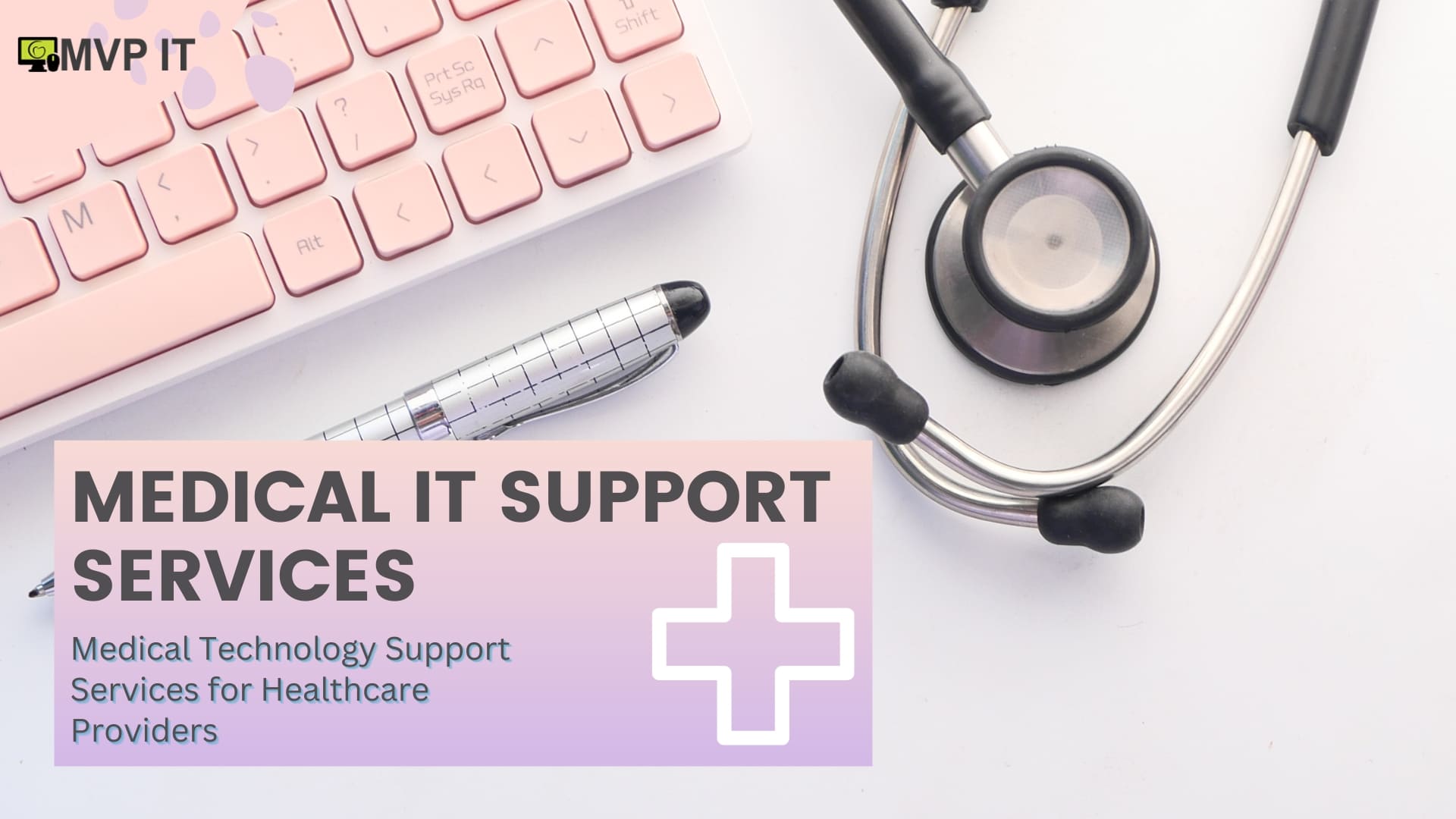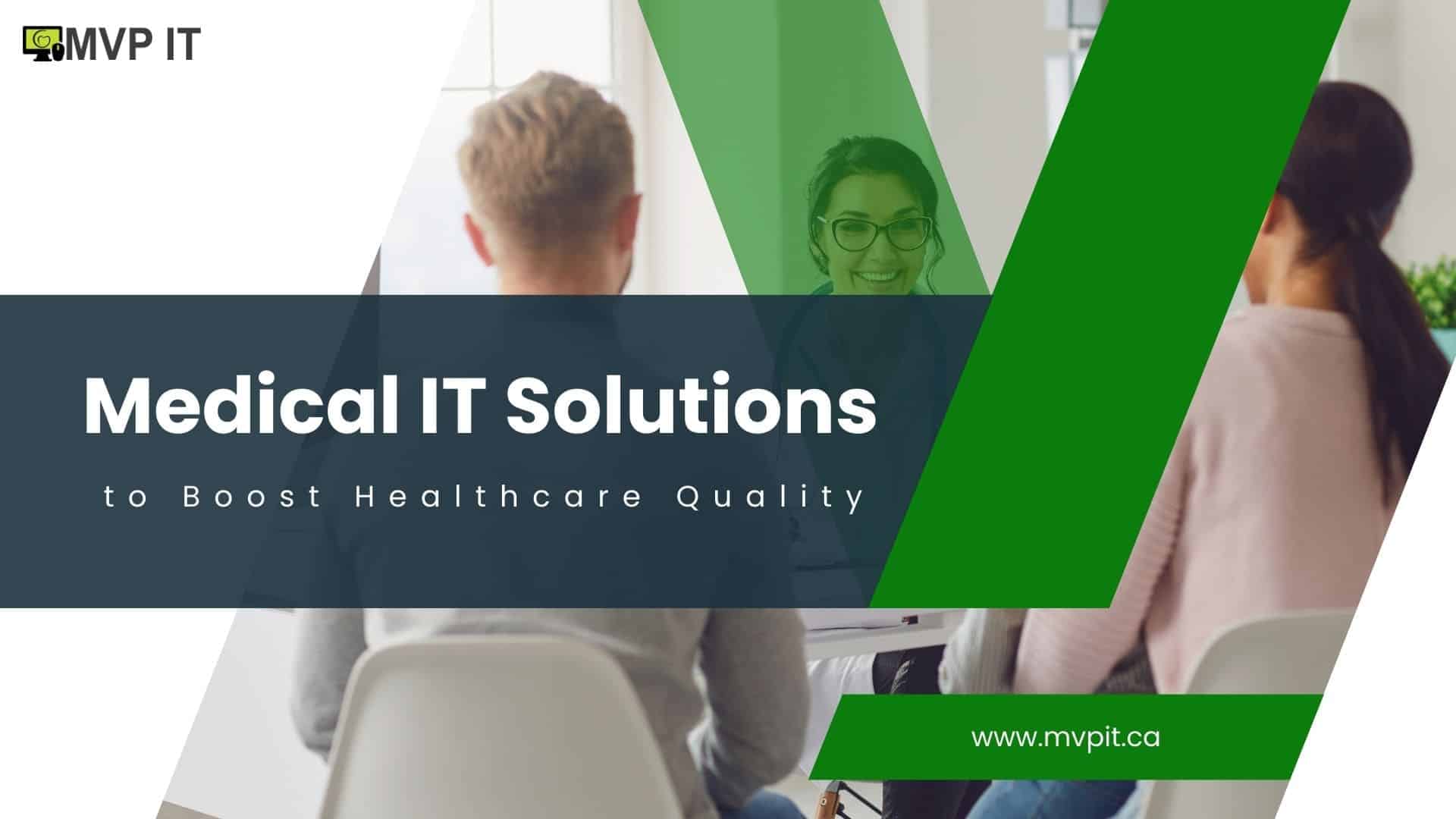MVP IT delivers comprehensive IT strategic support for medical professionals, optimizing technology infrastructure to meet industry demands. With over 6 years of experience, we ensure seamless operations, cybersecurity, and compliance, allowing medical practitioners to focus on delivering exceptional patient care without IT disruptions.
In the fast-evolving landscape of healthcare, the integration of Information Technology (IT) has become indispensable. Medical professionals, from doctors to administrative staff, are increasingly relying on IT strategic support to navigate the complexities of modern healthcare delivery. In this article, we’ll explore the challenges faced by medical professionals, the benefits of IT strategic support, key components, case studies, future trends, implementation considerations, and more.
Challenges Faced by Medical Professionals
Technological Complexity
The rapid evolution of technology presents a significant challenge for medical professionals. Navigating through intricate software and hardware systems requires a learning curve, affecting daily operations.
Data Security Concerns
With the digitization of patient records and sensitive information, ensuring robust cybersecurity measures is a top priority. Medical professionals face the constant threat of data breaches, emphasizing the need for robust protection.
Integration Issues
Coordinating various IT systems within a medical practice can be challenging. Seamless integration is crucial for smooth workflow and effective patient care.
Benefits of IT Strategic Support
Enhanced Efficiency
IT strategic support streamlines administrative tasks, reducing manual workloads. This efficiency allows medical professionals to focus more on patient care, improving overall service quality.
Improved Patient Care
Access to electronic health records (EHR) facilitates comprehensive patient care. Medical professionals can make informed decisions promptly, resulting in improved treatment outcomes.
Streamlined Communication
Efficient communication is vital in healthcare settings. IT support enables seamless communication between different departments, ensuring a coordinated approach to patient care.
Key Components of IT Strategic Support
Electronic Health Records (EHR)
EHR systems centralize patient information, promoting accessibility and accuracy in healthcare records. This component enhances collaboration among medical professionals.
Cybersecurity Measures
Implementing robust cybersecurity measures safeguards patient data from unauthorized access and potential cyber threats, ensuring compliance with privacy regulations.
Telemedicine Solutions
The integration of telemedicine solutions allows medical professionals to provide remote consultations, expanding access to healthcare services and enhancing patient convenience.
Case Studies
Successful Implementations
Examining real-world examples of successful IT implementations in medical practices highlights the positive impact on efficiency and patient outcomes.
Real-world Impact on Medical Practices
By delving into case studies, we can understand how IT support has transformed medical practices, showcasing tangible benefits.
Future Trends in IT Support for Medical Professionals
Artificial Intelligence in Healthcare
AI applications offer predictive analytics and personalized treatment plans, revolutionizing the way medical professionals approach patient care.
Remote Patient Monitoring
Technological advancements enable remote monitoring of patients, allowing medical professionals to track health metrics and intervene proactively.
Predictive Analytics
Analyzing large datasets through predictive analytics aids in identifying trends, enabling medical professionals to anticipate and address potential health issues.
IT Strategic Support for Medical Professionals
Budgetary Constraints
Medical practices, especially smaller ones, may face budgetary limitations. Implementing cost-effective IT solutions becomes crucial for long-term sustainability.
Training and Adoption
Ensuring that medical professionals are well-trained and comfortable with IT systems is essential for successful implementation and utilization.
Regulatory Compliance
Staying compliant with healthcare regulations is paramount. IT systems must align with regulatory standards to avoid legal issues.
Tips for Choosing IT Support Providers
Industry Experience
Choosing providers with experience in healthcare IT ensures a deeper understanding of the specific challenges faced by medical professionals.
Customization Capabilities
IT solutions tailored to the unique needs of a medical practice are more likely to enhance efficiency and improve overall performance.
Reputation and Reviews
Reviewing the reputation and feedback from other medical practices helps in selecting trustworthy IT support providers.
Testimonials from Medical Professionals
Experiences with IT Support
Hearing firsthand experiences from medical professionals who have embraced IT support provides valuable insights.
Positive Outcomes
Understanding the positive outcomes achieved by medical practices through IT support encourages others to consider similar implementations.
Common Misconceptions about IT in Healthcare
Resistance to Change
Addressing the misconception that resistance to technological change is common among medical professionals, emphasizing the benefits of embracing IT support.
Data Privacy Concerns
Dispelling concerns about data privacy by highlighting the stringent security measures in place to protect patient information.
Affordability
Highlighting cost-effective IT solutions available for medical practices, debunking the misconception that implementing IT support is financially burdensome.
How IT Support Can Transform Small Medical Practices
Leveling the Playing Field
IT support allows smaller medical practices to compete with larger counterparts by enhancing efficiency and improving patient care.
Cost-Effective Solutions
Emphasizing that IT support can be tailored to suit the budgetary constraints of smaller medical practices, making it an affordable investment.
Steps to Implement IT Strategic Support
Assessment of Current Systems
Conducting a thorough assessment of existing systems lays the foundation for effective IT implementation.
Planning and Strategy Development
Formulating a comprehensive plan and strategy ensures a smooth transition to IT support, minimizing disruptions.
Implementation and Training
Executing the plan with adequate training for medical professionals ensures a successful integration of IT support into daily operations.
Continuous Improvement in IT Systems
Regular Updates and Upgrades
Regularly updating and upgrading IT systems ensures they remain effective, secure, and aligned with evolving healthcare standards.
Feedback Mechanisms
Establishing feedback mechanisms allows medical professionals to contribute to system improvements, fostering a collaborative approach.
Success Stories in Medical IT Support
Notable Examples
Showcasing successful examples of medical practices that have thrived after implementing IT support.
Impact on Patient Outcomes
Highlighting how IT support has positively impacted patient outcomes, underscoring the significance of technological advancements in healthcare.
Conclusion
In conclusion, IT strategic support is not merely a technological addition but a transformative force in the medical field. From enhancing efficiency to improving patient care, the benefits are undeniable. Medical professionals must embrace IT support to stay competitive and deliver optimal healthcare services.









